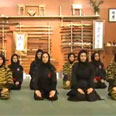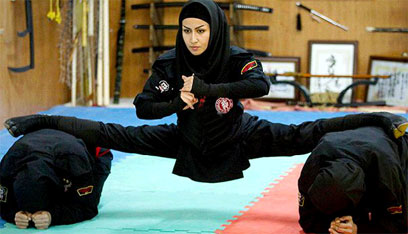
Iran: Reuters chief convicted in 'ninja' dispute
Special media court finds news agency's Tehran bureau chief guilty of 'spreading lies' against Islamic system for video story that briefly included posted description of women training as martial arts killers
The state-owned news website YJC.ir quotes Ali Akbar Kasaeian, spokesman for the court panel, as saying Iranian national Parisa Hafezi was convicted of propaganda-related offenses for a February video that initially carried a headline saying the women were training as ninja "assassins." Iran's state Press TV also reported the court decision.
Related stories:
The Reuters headline was corrected, but it led to the suspension of the Reuters bureau in Tehran in March. Most of the Reuters staff shifted to Dubai, but Hafezi was not allowed to leave Iran.
Reuters was also found guilty of "publishing false information in an effort to disturb public opinion" over the ninja report, Iran's official Islamic Republic News Agency said, quoting the Tehran prosecutor's office.
Press TV report
Barb Burg, a spokeswoman for Reuters, said: "We understand that the jury has stated its view and we now await the court's ruling. We do not intend to comment further until a decision is issued."
The case stems from a report Reuters did on a group of female ninjas training in the sport in the city of Karaj, west of Tehran. The original headline on the story erroneously read "Thousands of female Ninjas train as Iran’s assassins".
Reuters subsequently changed the headline to read "Three thousand women Ninjas train in Iran". It later removed the report.

Iranian women ninjas
Reuters' global editor in chief, Stephen Adler, told The New York Times newspaper on March 29 that the headline mistake was not malicious, and added: "I don't see factual errors in the story."
A sentence by the court is expected within a week. The media court rarely deals with international news outlets, but often issues rulings against domestic media for various violations with punishments including fines, closure or jail sentences.
Last week, the moderate newspaper Shargh was ordered shut over a caricature that hardliners have interpreted as insulting to war veterans. In the past, Iranian authorities have revoked credentials of staff of foreign media or expelled foreign staff over reporting deemed objectionable, such as interviews with opposition figures.
After the disputed 2009 re-election of President Mahmoud Ahmadinejad, Iran's powerful Revolutionary Court dealt with some high-profile press cases, including Canadian-Iranian journalist Maziar Bahari of Newsweek, who was freed on $300,000 bail in October 2009 after nearly four months detention.
The Associated Press and AFP contributed to this report
- Follow Ynetnews on Facebook and Twitter
- Receive Ynetnews updates directly to your desktop










